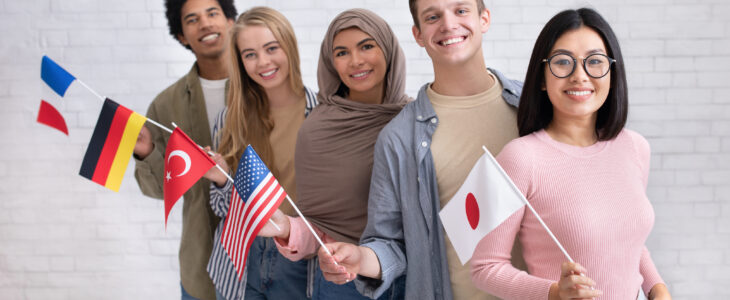Pursuing an education in the United States is a dream for many students worldwide, but navigating the complexities of the U.S. student visa process can be overwhelming. With numerous forms, strict requirements, and potential challenges, obtaining a student visa requires careful attention to detail and an understanding of the legal system. At Central Justice, we assist international students and their families in Orlando with the student visa application process, ensuring compliance with immigration laws and helping make the journey to study in the U.S. as smooth as possible.
What is a Student Visa?
A student visa allows non-U.S. citizens to enter the country for the purpose of studying at an accredited educational institution. The United States offers two primary types of student visas:
F-1 Visa (Academic Students)
The F-1 visa is the most common student visa, issued to individuals enrolled in academic programs at:
- Colleges and universities
- High schools
- Private elementary schools
- Seminaries or conservatories
- Language training programs
M-1 Visa (Vocational Students)
The M-1 visa is for individuals attending vocational or technical schools. This visa is specifically for students pursuing non-academic programs or training in areas like mechanics, culinary arts, or cosmetology.
Eligibility Requirements for a Student Visa
To qualify for an F-1 or M-1 visa, you must meet the following requirements:
- Acceptance to an Accredited School: You must first be accepted by a U.S. educational institution certified by the Student and Exchange Visitor Program (SEVP).
- Proof of Financial Support: You must demonstrate that you have sufficient funds to cover your tuition and living expenses while in the U.S.
- Intent to Return Home: You must prove to the U.S. government that you intend to return to your home country after completing your studies.
- English Proficiency: Depending on the program, you may need to demonstrate proficiency in English through tests like TOEFL or IELTS.
The Student Visa Application Process
Applying for a student visa involves several steps. It’s essential to follow the process carefully to avoid delays or denials:
Obtain a Form I-20
Once you are accepted by an SEVP-certified school, the school will issue a Form I-20 (Certificate of Eligibility for Nonimmigrant Student Status). This document is required to begin your visa application.
Pay the SEVIS Fee
You must pay the SEVIS (Student and Exchange Visitor Information System) fee before applying for your visa. This fee supports the system that tracks your status while in the U.S.
Complete the DS-160 Form
The DS-160 is an online application form for nonimmigrant visas. It collects your personal, educational, and travel information. Be sure to complete this form accurately.
Schedule and Attend a Visa Interview
You will need to schedule an interview at a U.S. embassy or consulate in your home country. During the interview, you must provide:
- A valid passport.
- Your Form I-20.
- Proof of financial support.
- Proof of ties to your home country.
Receive Your Visa
If approved, your visa will be placed in your passport, allowing you to travel to the U.S.
Challenges in the Student Visa Process
The student visa process can present several challenges, including:
- Delays in Processing: Delays can occur if documents are incomplete or if there are security concerns.
- Denials Due to Insufficient Proof: Failing to demonstrate financial stability or intent to return home may lead to denial.
- Visa Limitations: Student visas do not allow for extended stays beyond your program duration without proper authorization.
At Central Justice, we help clients address these challenges by preparing strong applications and ensuring all requirements are met.
Maintaining Your Student Visa Status
Once you’ve obtained your student visa, it’s crucial to maintain compliance with its terms to avoid legal issues:
- Full-Time Enrollment: You must remain enrolled as a full-time student.
- No Unauthorized Employment: Employment is restricted while on a student visa. Certain on-campus jobs or internships may be permitted with approval.
- Follow Travel Rules: If you travel outside the U.S., ensure your visa and Form I-20 are valid for reentry.
Failure to adhere to these requirements can result in losing your student visa status and facing deportation.
How Central Justice Can Help
The attorneys at Central Justice understand the challenges international students face when navigating the student visa process. Our team is here to provide:
- Guidance on selecting the correct visa type (F-1 or M-1).
- Assistance in completing and submitting the necessary forms.
- Preparation for your visa interview to ensure you’re ready to address key questions.
- Support with issues like visa renewals, extensions, or changes in status.
Whether you’re applying for the first time or need help addressing a specific issue, our legal experience can make a difference.
Why Choose Central Justice?
At Central Justice, we’re dedicated to helping students achieve their educational goals in the United States. With our personalized approach and in-depth knowledge of immigration law, we’ll guide you through the complexities of the student visa process with confidence.
Contact Us Today
If you’re seeking assistance with a student visa application or need help resolving a visa-related issue, contact Central Justice in Orlando. Let us help you take the next step toward achieving your educational dreams in the United States. Schedule a consultation today!

